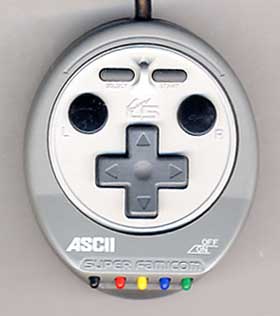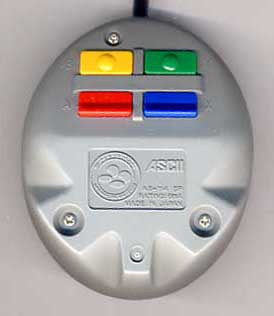-
Posts
2,919 -
Joined
-
Last visited
Content Type
Profiles
Forums
8Tracks
Events
Blogs
Posts posted by Arcana
-
-
I was about to blast the idea of a "reboot" as being potentially destructive to the entire heart of Castlevania (look at what the Wii fighting game did to the characters) but then I heard Patrick Stewart's voice in the trailer.
Now this game is epic.
-
Games like Suikoden, Wild ARMs, Tomb Raider, Resident Evil, Chrono Cross, and Alundra, are all a chore to play because they're clunky, have bad rendering, are a bit offsetting to look at, or have horrible load times...
I would argue that, most RPGs age poorly unless they have a particularly legendary battle system, or an immensely complex story that has many subtleties in writing and plot direction.
About the only RPGs I can think of that I would still play and really enjoy for the battle system alone is Final Fantasy Tactics, Secret of Mana, Chrono Trigger, and possibly Tactics Ogre.
Almost no RPG would gain 'instant classic' points based solely on the storyline. While a lot of the games have stories that are "good the first time through", many of them simply do not have the writing or the acting to back them up.
Someone brought up art direction as something that makes a game transcend time. I believe that this is true but only second to the story and the battle system. For instance, Kartia is a still-unknown game that I love to death because its writing is extremely solid (seriously, it has pretty much zero translation errors in an era of games wrought with translation difficulty), but also because its art direction really backs up its storytelling. The battle system kind of sucked, though. But I don't know if I could play it a second or third time without getting bored, since I know what the story is like already.
I think something that is key here is the effect of playing a game versus replaying a game. There are many games that I can recommend playing without replaying, and in fact I would say the vast majority of single-player games are best played once, and then never again.
-
As someone who's still really learning, these could be a great learning tool. I recently collaborated with someone who does have a great deal of knowledge of chord progressions and music theory. She gave me a chord progression, I produced the song and came up with something that actually sounded really good.
I think that there's three benefits here.
First, if you don't have any theory knowledge, you can sit down and read some things based on what you've been given. I keyed in something and got:
The progression currently shown is a ( I - IV - ii Add 9th - V - vii half dim 7th ) progression in the key of C Major.
If you don't know theory, you'll have a lot to look at based on that phrase alone. What are the Roman numerals? What's a 9th chord? What's a half-diminished 7th chord?
Second, it allows you to learn what "certain chords" sound like. I personally have a terrible ear and can't detect chord tones easily from listening to songs. But, if you give me a progression and then give me a "sounds like?" question, I'll probably be able to figure it out. So you can get a sense if the song is uplifting, or dramatic, or meandering, or whatever.
Finally, if you like music but don't really want to work on the composition side of things (!!!), a chord progression generator allows you to focus on production without you getting tripped up on bad notes or whatever.
But, I remember one question long ago on these boards that went along the lines of "Should I compose first with harmony, or melody?" Overwhelmingly, the answer was that you should avoid learning to compose harmony first, because then your melodies will end up sounding generic and boring, which is a problem.
Another issue with that generator is that it only appears to give you 2-6 chords at a time, so if you want to make a song with more than 4 chords (you do, right?) you'll either have to end up plugging stuff into the generator multiple times (leading to a lack of unity in your song) or you'll have to actually learn how to fill in the rest of the song.
-
Anyway, why are you so against the thought of a game going multi-platform anyway? It's not like back in the mid-90's when anyone with only a Nintendo system was shit out of luck if they wanted the next Final Fantasy or Street Fighter for the N64. You still get to play the game.
I can actually understand why a particular director or developer would be against a game going multiplatform, mostly due to implementation issues. If you as a director have a vision, then going cross-platform risks compromising the vision (through making various graphic and control sacrifices). You need to consider dumbing down your game to meet the lowest common denominator.
However, the XBox 360 and the PS3, from an end-user standpoint, have analog features across the systems. XBox 360 has memory cards and hard drives, PS3 has hard drives. XBox 360 has soft squishy buttons on its controller, PS3 has soft squishy buttons on its controller. PS3 has full HD, XBox 360 doesn't quite have full HD but it's close enough for 66% of people not to notice a difference.
About the only appreciable difference now is that the XBox 360 requires disc switching compared to the PS3. And, XBox Live! is much more mature than PS Home, but I don't see online connectivity affecting a single player RPG much.
There's very little reason nowadays not to release cross platform, unless your game uses some niche feature of a system, or if there's some kind of political reason (ex: exclusivity deals).
-
May your days be ever filled with good trance and electro-house.
-
Well I don't know about Europe or April and May sales other than overall the game has sold 5.5 million thus far, but at least in March, the 360 version in NA sold upwards of 500k copies.
I was curious about this so I looked this up and found:
http://kotaku.com/5518301/final-fantasy-xiii-ps3-nearly-doubles-xbox-360-version-in-us-sales
Thus for April, in the USA:
PS3: 828,200
XBox360: 494,300
-
I got some heavy firepower for you: the one and only Ascii Super L5!


One day I forgot I had left the turbo on. Ended up erasing all my Chrono Trigger saves in the blink of an eye.
Good times...
I wanted one of these because you could play games with one hand and take notes or talk on the phone with the other. This was back before all RPGs came with built in dungeon maps and auto stat previews for items.
-
Have a good birthing day ms maelie jade.
-
Considering that web cams and 3D glasses are things you are seeing in use today even now, I can understand why they decided instead to go for R.O.B., the Power Pad, and the Activator.
I liked watching the 80s commercials though, those were pretty fun.
-
I quit using Reason at 3 and haven't upgraded to Reason 4 or Record. Is there a compelling reason to do it now? I kind of got tired of having to navigate a huge rack of equipment with an insane combination of wires in the back, and trying to figure out which automation tracks matched to which mixer channels when doing mixing and effects.
-
Your studio monitors can probably push up to 128-135 dB. If you're testing an audio set up, make sure that the volume levels are turned down low because if you blast something from them by accident you'll nearly knock yourself out.
I heard a story along those lines from a friend who was trying to set up his mixing desk and he didn't realise he had all of the levels turned up to maximum, played a test sound, and basically stood there dazed for a few seconds. He felt winded as a result of the sound.
-
Cheers Fratto. You can grab a drink from the "Post Something Random In This Thread", there's a large variety to choose from.
-
bLiNd serves up some nice hard stuff in this track.
But yet it's so refreshing and bright. There's so much good texture to this song and a lot of subtle things that go in in the background.
There's so much talent in this guy, I'm glad that he's so willing to share it.

-
Okay I think I managed to rectify a bunch of stuff with some advice. Part of the problem was actually just the mix itself, there were a lot of tracks that weren't levelled well, I had a lot of effects applied poorly, and it all and contributed to a muddy, dull sound. I believe it's loud enough now. I'll post excerpts later this week for comparison just to make sure.
-
While I can't say I'm an expert in the era's of video game music, I can give a theory that I have come up with to describe what I feel has had the most influence on it.
A calculus teacher of mine once described "the holy trinity of classical music:" Beethoven, Mozart, and Bach. Beethoven was seen as a composer who could wrap his mind around an idea and create a symphony. Mozart was able to instantly create music that was easily remembered, a true genius. Bach was a man who really put the emotion into the music.
I then applied that to whom I consider the "holy trinity of video game music:" Uematsu, Kondo, and Mitsuda.
Kondo has the gift of taking melodies and getting them recognised by a large amount of people. Look at Super Mario Bros. for example. I have seen parties stop just because somebody starts playing the SMB Overworld theme on a nearby piano. The parties then turn into a request for more. Kondo also did well for Legend of Zelda, which has just as much recognition as Mario.
Uematsu has music that matches the game very well. When playing FF7 for the first time, I actually felt like the theme from Cosmo Canyon actually belonged. Aeris's theme brought me to tears, although seeing her die brought me to tears as well, (because I wasted so much time leveling her up.) And I was thrown for a loop when I heard One Winged Angel, just because of the complexity.
Mitsuda has a talent of putting a story in the music alone. I heard the Chrono Trigger soundtrack, and was litterally blown away at the variety that was put forth. I then managed to fall in love more with the celtic sound of Chrono Cross. The point of his music is that you don't have to understand where the story of the game went to understand a general plot of the music itself.
Uematsu said specifically that he was greatly inspired by Koichi Sugiyama, of Dragon Quest fame, and that in Japan Sugiyama is considered the grandfather of video game music. Uematsu was specifically asked to produce something that sounded different from Sugiyama when he was hired for Final Fantasy.
But there are also little differences in video game music compared to when composing music for a movie for example. Hardware limitations, compression of files (MP3/OGG for example made a huge influence in PC and console music because it meant you could now have fully-recorded soundtracks), the need for looping, and the need to record enough music to last a player tens of hours (compared to the 2 hours or so for a movie soundtrack).
-
Actually, you're right. A better word would be inconsistencies, especially when it comes to characterization.
Out of all the things to complain about, I don't think inconsistent characterization would be the thing to highlight. To me the characters seem quite consistent in the way they act and in their motivations.
Your issues with plot pacing, to me, are much more tangible. There's a particular event about halfway through the game that probably should have been foreshadowed to the player much earlier. They tried it with a few techniques, but it wasn't nearly obvious enough.
-
Yeah, bleck is right, FF XIII removed a lot of the things that hardcore JRPG fans thought they'd find in a Final Fantasy game (or even generic JRPGs), like overworld maps, a boy with a sword, a sexy bishi bad guy, boring turn-based combat, and stupid cutscenes of the main male lead being teased by all of the females in one room. And other dumb anime tropes like that. So all of the people who wanted turn-based grinding, huge maps, towns with item shops, and a chocobo farm were invariably disappointed.
There are a few problems with what they built now (mostly due to the story pacing being really slow for the first 10 hours, and the crawl at Chapter 11, and some key missing interactions explained only in the catalog, not to mention the cheesy ending) but I enjoyed it precisely because it wasn't another typical JRPG where we first went into a big city to win big at the casino, then we had to go take a ship and invariably that ship will be either a ghost pirate ship or it will be wrecked in a deep sea disaster of some sort.
I feel that in many ways, FF XIII was designed to appeal more to an adventure game/action game crowd, while still trying to maintain a character-driven story. I think it succeeded in this respect (as much as you might all hate on it, it's been the fastest-selling Final Fantasy game to date) though it possibly went too far into the "action-game" direction where you'd fight in part of a map, get a cutscene, continue on, get another cutscene, and then fight a boss.
-
As Necrotic said:
This bundle has now raised over 1 million dollars in about a week.
Aquaria, Gish, Lugaru HD, and Penumbra Overture are planning to go open-source, so if any of you are interested in how these games work it might be a good place to start.
-
i know, idiot. i'm just saying that it was actually warranted here, instead of someone saying how they're dying of cancer and then someone either says that or tl;dr.
He wrote that post, of course he will defend it.
-
Haha, pud.

Hey it works for what I want it for, which is reading PDF papers and sometimes surfing the web and playing games.
(what's a pud?)
-
I bought an iPad for PDFs and textbooks (among other reasons). It works much better than eInk-based devices for PDFs since the refresh rate is much higher than most eInk devices. You can scroll around and zoom in freely and it's about as fast as doing it on your computer, but more natural due to the touch screen and slate form factor.
Granted I haven't tried using a modern eBook Reader since they got "big" (I used one that was from about 2007) but AFAIK about eInk, the refresh rates are extremely low and thus are bad for textbooks, comic books, and PDFs in which you have to scroll around.
My main problem with the iPad right now is that I don't have a good PDF annotator. I could probably buy one but I don't know which PDF program is "the best" at such things.
-
Okay, JRPGs have really always been about two things:
1) Story (and characters)
2) Battle system
It's not like Final Fantasy XIII is light on storyline or something. It's definitely not traditional JRPG fare, despite what everyone wants to think.
It's funny. People complained to hell about how Final Fantasy is filled with too many girly boys and stupid plots about angsty heroes with swords that save the world and get the girl (who is invariably a white mage of some kind) and then when Final Fantasy XIII comes out and actually changes a few of the conventions, the same group is all eyeroll about how bad it is and how it's not as memorable as ___.
In many ways, Final Fantasy XIII was an experiment to see if a Japanese development team could take the "J" out of JRPG.
-
Link to the track!
It's a project track and thus I don't want to make it available or else I'd link it here. BTW added a picture above in my post
-
Well when I say near clipping, I lied. I actually meant "I use a limiter, without it my song is 4 db over peak" . I actually really wanted to mix the song without relying on the limiter, but even with it it sounds really quiet.
However none of the individual tracks approach clipping levels and none of them use limiters either.
the waveform of my song is pretty wide, with lots of peaks and valleys but I will do some Audacity stuff tonight and post it for discussion.
Uploaded with ImageShack.us




Castlevania ~ Lords of Shadow
in General Discussion
Posted
Reboot the franchise = create an alternate universe for it (a recent example is the live-action Star Trek directed by J.J. Abrams).
Often that also means discarding things that were previously held in the series as tradition.
I don't really follow Castlevania much but I know people who are huge fans and might not actually be thrilled with the idea of a "reboot".
So that's why I was prepared to come in with a whole bunch of vitriol to crap all over this. But, but look, they hired REAL ACTORS.